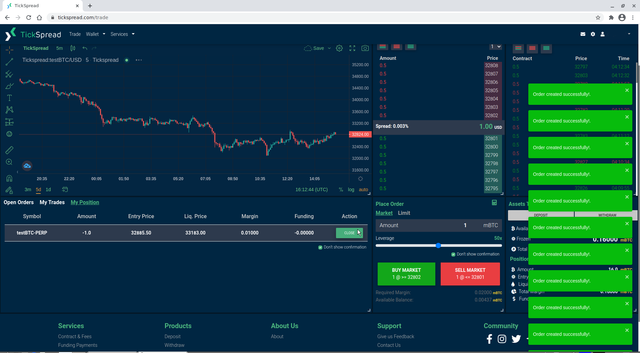I'm not even gonna argue anymore on this forum.
I will just drop the code that say's it all.
// Copyright (c) 2009-2019 The Bitcoin Core developers
// Distributed under the MIT software license, see the accompanying
// file COPYING or
http://www.opensource.org/licenses/mit-license.php.
#include <wallet/crypter.h>
#include <crypto/aes.h>
#include <crypto/sha512.h>
#include <util/system.h>
#include <vector>
int CCrypter::BytesToKeySHA512AES(const std::vector<unsigned char>& chSalt, const SecureString& strKeyData, int count, unsigned char *key,unsigned char *iv) const
{
// This mimics the behavior of openssl's EVP_BytesToKey with an aes256cbc
// cipher and sha512 message digest. Because sha512's output size (64b) is
// greater than the aes256 block size (16b) + aes256 key size (32b),
// there's no need to process more than once (D_0).
if(!count || !key || !iv)
return 0;
unsigned char buf[CSHA512::OUTPUT_SIZE];
CSHA512 di;
di.Write((const unsigned char*)strKeyData.data(), strKeyData.size());
di.Write(chSalt.data(), chSalt.size());
di.Finalize(buf);
for(int i = 0; i != count - 1; i++)
di.Reset().Write(buf, sizeof(buf)).Finalize(buf);
memcpy(key, buf, WALLET_CRYPTO_KEY_SIZE);
memcpy(iv, buf + WALLET_CRYPTO_KEY_SIZE, WALLET_CRYPTO_IV_SIZE);
memory_cleanse(buf, sizeof(buf));
return WALLET_CRYPTO_KEY_SIZE;
}
bool CCrypter::SetKeyFromPassphrase(const SecureString& strKeyData, const std::vector<unsigned char>& chSalt, const unsigned int nRounds, const unsigned int nDerivationMethod)
{
if (nRounds < 1 || chSalt.size() != WALLET_CRYPTO_SALT_SIZE)
return false;
int i = 0;
if (nDerivationMethod == 0)
i = BytesToKeySHA512AES(chSalt, strKeyData, nRounds, vchKey.data(), vchIV.data());
if (i != (int)WALLET_CRYPTO_KEY_SIZE)
{
memory_cleanse(vchKey.data(), vchKey.size());
memory_cleanse(vchIV.data(), vchIV.size());
return false;
}
fKeySet = true;
return true;
}
bool CCrypter::SetKey(const CKeyingMaterial& chNewKey, const std::vector<unsigned char>& chNewIV)
{
if (chNewKey.size() != WALLET_CRYPTO_KEY_SIZE || chNewIV.size() != WALLET_CRYPTO_IV_SIZE)
return false;
memcpy(vchKey.data(), chNewKey.data(), chNewKey.size());
memcpy(vchIV.data(), chNewIV.data(), chNewIV.size());
fKeySet = true;
return true;
}
bool CCrypter::Encrypt(const CKeyingMaterial& vchPlaintext, std::vector<unsigned char> &vchCiphertext) const
{
if (!fKeySet)
return false;
// max ciphertext len for a n bytes of plaintext is
// n + AES_BLOCKSIZE bytes
vchCiphertext.resize(vchPlaintext.size() + AES_BLOCKSIZE);
AES256CBCEncrypt enc(vchKey.data(), vchIV.data(), true);
size_t nLen = enc.Encrypt(vchPlaintext.data(), vchPlaintext.size(), vchCiphertext.data());
if(nLen < vchPlaintext.size())
return false;
vchCiphertext.resize(nLen);
return true;
}
bool CCrypter::Decrypt(const std::vector<unsigned char>& vchCiphertext, CKeyingMaterial& vchPlaintext) const
{
if (!fKeySet)
return false;
// plaintext will always be equal to or lesser than length of ciphertext
int nLen = vchCiphertext.size();
vchPlaintext.resize(nLen);
AES256CBCDecrypt dec(vchKey.data(), vchIV.data(), true);
nLen = dec.Decrypt(vchCiphertext.data(), vchCiphertext.size(), vchPlaintext.data());
if(nLen == 0)
return false;
vchPlaintext.resize(nLen);
return true;
}
bool EncryptSecret(const CKeyingMaterial& vMasterKey, const CKeyingMaterial &vchPlaintext, const uint256& nIV, std::vector<unsigned char> &vchCiphertext)
{
CCrypter cKeyCrypter;
std::vector<unsigned char> chIV(WALLET_CRYPTO_IV_SIZE);
memcpy(chIV.data(), &nIV, WALLET_CRYPTO_IV_SIZE);
if(!cKeyCrypter.SetKey(vMasterKey, chIV))
return false;
return cKeyCrypter.Encrypt(*((const CKeyingMaterial*)&vchPlaintext), vchCiphertext);
}
bool DecryptSecret(const CKeyingMaterial& vMasterKey, const std::vector<unsigned char>& vchCiphertext, const uint256& nIV, CKeyingMaterial& vchPlaintext)
{
CCrypter cKeyCrypter;
std::vector<unsigned char> chIV(WALLET_CRYPTO_IV_SIZE);
memcpy(chIV.data(), &nIV, WALLET_CRYPTO_IV_SIZE);
if(!cKeyCrypter.SetKey(vMasterKey, chIV))
return false;
return cKeyCrypter.Decrypt(vchCiphertext, vchPlaintext);
}
bool DecryptKey(const CKeyingMaterial& vMasterKey, const std::vector<unsigned char>& vchCryptedSecret, const CPubKey& vchPubKey, CKey& key)
{
CKeyingMaterial vchSecret;
if(!DecryptSecret(vMasterKey, vchCryptedSecret, vchPubKey.GetHash(), vchSecret))
return false;
if (vchSecret.size() != 32)
return false;
key.Set(vchSecret.begin(), vchSecret.end(), vchPubKey.IsCompressed());
return key.VerifyPubKey(vchPubKey);
}


 Or did you just make an image of the drive and search through the image?
Or did you just make an image of the drive and search through the image? 

